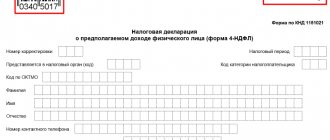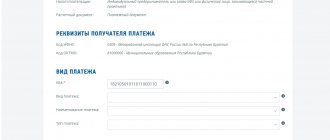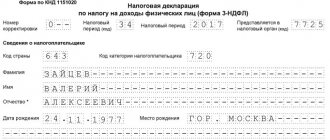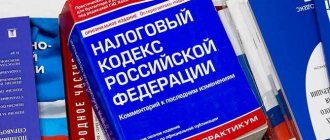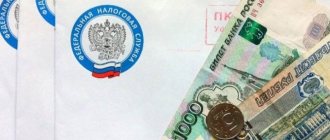Personal income tax stands for personal income tax . Payers of this tax are:
- residents of Russia, if they received income both in Russia and (or) abroad;
- non-residents of Russia if they received income in Russia
Residents are people who actually stayed in Russia for at least 183 calendar days over the next 12 consecutive months. Non-residents are people who do not fall under these conditions.
Changes in income tax
Income that is not taken into account when calculating income tax (Article 251 of the Tax Code of the Russian Federation, amended in 2021):
- Property rights to the results of intellectual activity identified during the inventory from January 1, 2021 to December 31, 2021
If an entrepreneur, during an inventory, discovers results of intellectual activity that he had not previously taken into account, income tax does not need to be reflected. The results of intellectual activity can be considered, for example, a program or website that has been used for more than a year.
It is important to take note of the changes now because this benefit is only valid until the end of 2021. If the benefit is not extended and in 2020 the entrepreneur discovers the results of intellectual activity, income tax will be taken into account.
- Unclaimed dividends restored to retained earnings
The founders have the right to receive dividends every year, but this must be indicated in the decision or minutes of the meeting of the founders. If there is no such decision or protocol, profits will accumulate every year.
If the founders decide to give up the profit after a few years, this amount will not be taken into account for income tax. If there was no decision and profits accumulate, in the future the founder has the right to declare profits and receive dividends.
- Property (rights) received as a contribution to property, if its contribution is provided for by the constituent documents
Investments in property to increase net assets from 2021 must be included in income.
When receiving money, property, goods, works and services from the founder free of charge, income tax income is not taken into account (clause 11, clause 1, article 251 of the Tax Code of the Russian Federation). The founder's share in the authorized capital must be more than 50%. If the founder leases the property, the benefit is not taken into account.
If the founder's share is 50% or less, the gift cannot be received through an increase in net assets. If you receive a gift from the founder as a contribution to the property (this can be money), you do not have income tax income.
- Sureties received free of charge, guarantees in transactions between Russian non-banking organizations, services received free of charge
Personal income tax rates in 2021 for residents
| Tax rate | In what cases is it used? |
| 13% | Income from the work of highly qualified foreign specialists |
| Income from employment based on a patent | |
| Income from the work of crew members of ships that fly the Russian flag | |
| Income from the work of participants in the state program for the resettlement of compatriots to Russia | |
| Income from the work of foreign refugees or people with temporary asylum | |
| 15% | Dividends received from Russian organizations |
| 30 % | Income from securities of Russian organizations, the rights for which are recorded in securities accounts of foreign holders (depository programs), if such income is paid to persons whose information has not been provided to the tax agent in accordance with Article 214.6 of the Tax Code |
| All other income, except in cases of double taxation |
Taxation of founders' income (changes relevant in 2021)
- Equated to dividends the income of participants - parent companies, which they received from leaving a subsidiary or as a result of its liquidation (clause 3 of Article 284 of the Tax Code of the Russian Federation)
From 2021, for the founders of a legal entity, dividends include income received upon leaving the organization or its liquidation.
For a legal entity, a profit tax rate of 13% must be applied.
If the founder - a Russian company - has a stake of more than 50% in the authorized capital of a subsidiary and he has owned his share for more than a year, a 0% income tax rate must be applied.
- If the founder leaves the subsidiary or it is liquidated and he receives losses instead of profits, the participant’s loss can be taken into account as non-operating expenses.
The amount of loss is the difference between the market value of the property received and the contribution to the authorized capital of the subsidiary (clause 8, clause 2, article 265 of the Tax Code of the Russian Federation).
- The return of the deposit was exempted from income tax only within the amount of the contribution to the property of the “daughter”, which was made in money.
If the parent company contributed money to the property and decided to get it back, it does not have income tax income.
Income subject to personal income tax
Let's figure out which income is subject to personal income tax and which is not taxed.
There are quite a lot of incomes that are subject to personal income tax: (click to expand)
- income from the sale of property that was owned for less than 3 years;
- income from employment;
- dividends;
- income from rental property;
- income received from sources located outside of Russia;
- income from winnings;
- Other income.
Travel expenses for employees can be included as income tax expenses
Changes to Art. 255 of the Tax Code of the Russian Federation are applied starting from January 1, 2019.
From January 1, 2021, expenses can include the cost of travel packages for employees and their families. The employer has the right to pay for employee vacations and include them as expenses for income tax purposes. The organization can pay the cost of travel, travel, accommodation and excursions for employees.
In this case, the employee must rest in Russia, and the costs should not exceed 50,000 rubles. for one person. If an employee is traveling with family members, you can pay for the vacation of his family members in the amount of 50,000 rubles. per person.
The entire amount together can be taken into account in expenses of no more than 6% of labor costs in the aggregate.
The condition for paying employees for rest must be specified in employment contracts and in the wage regulations, then the costs will be taken into account.
When paying for resort packages in Russia, personal income tax is not charged (Article 417 of the Tax Code of the Russian Federation). This amount does not include food, accommodation, excursions, travel, only the amount of the voucher itself without personal income tax. Personal income tax is not charged if the cost of tours is not included in income tax expenses.
If the amount is included in personnel documents (employment contract, salary regulations), the employer is obliged to take these costs into account and charge personal income tax.
You can draw up a gift agreement and give vouchers to employees, then the amount will be used as expenses and there will be no personal income tax on health resort vouchers.
The object of taxation of insurance premiums is the amounts that an employee receives within the framework of labor relations (Article 420 of the Tax Code of the Russian Federation). If you formalize the relationship with a gift agreement, the vouchers will not be subject to insurance premiums. This is confirmed by judicial practice and letters from the Ministry of Finance (Letter dated 04/30/2019 No. 03-04-05/32077: personal income tax and insurance premiums must be charged on the amount of compensation and payment to employees for the cost of tourist vouchers; Ruling of the Supreme Court of the Russian Federation dated 04/03/2019 No. 303-S19 -3277: payment to “pests” for vouchers for sanatorium and resort treatment is not subject to insurance premiums).
If we are talking about family members of an employee, you can not include the cost as an expense and register a donation. There will be no personal income tax or insurance contributions, since the employer does not have an employment relationship with these people. Relationships with an employee can be divided into labor and other relationships under a gift agreement, providing vouchers.
List of fixed assets that can be depreciated at an increasing rate
This list has been updated as of January 1, 2021. But changes that affect fixed assets will be important in 2021.
When you purchase a fixed asset, it is subject to depreciation. For income tax, you can apply a depreciation bonus (10 or 30%). Depreciation goes into expenses. This provides the tax base for income tax. The income tax rate is 20%.
If we take the cost of a fixed asset, for example, 1 million rubles, income tax will decrease on the cost of this object by only 20%. The amount of depreciation will go to cost, forming a tax base, which is taxed at a tax rate of 20%.
In 2021, officials allowed a stronger reduction in income tax. For example, if a fixed asset cost 1 million rubles, you need to calculate the income tax to the federal budget and reduce it by 10% of the cost of the fixed asset (100,000 rubles). The remaining up to 90% of the cost of the object can be reflected in a reduction in the tax that is paid to the subject of the Russian Federation.
The list of equipment that is operated under the best available technologies has been expanded. Such equipment can be depreciated with an increasing factor of 2 (clause 1 of Article 259.3 of the Tax Code of the Russian Federation), if the equipment is included in this list.
The initial list was established by Government Order No. 1299-r dated June 20, 2017. Government Order No. 622-r dated 04/07/2018 expanded it more than twice.
Environmental fee
For a number of products, the cost of products includes the amount of environmental fees. The list of such commodity items was fixed by the Government in Order No. 2970-r dated December 28, 2017. In 2018, the levy applies to 36 groups of goods; starting next year, it will be introduced for 54 categories. For existing types of products, an increase in collection rates is planned, for example:
- by 11.4% for textile products, clothing, wooden containers, petroleum products, rubber products (including tires), sheet glass, computer and household appliances, photographic equipment, tools, lighting;
- by 21.4% for batteries;
- by 28.5% for stationery and paper products, household goods, sanitary products, toiletries;
- 53.9% growth is based on hollow glass;
- Plastic products will be much more expensive for manufacturers - the fee will increase for packaging materials made from these raw materials by 171.4%, and for construction products by 121.9%;
- metal containers and containers made from ferrous metals are breaking records – an increase of 725.4%.
Investment tax deduction
Changes from 2021 will be made to Art. 286.1 Tax Code of the Russian Federation.
In 2021, Art. 286.1 of the Tax Code of the Russian Federation, an investment tax deduction was introduced. However, local authorities approve it additionally in each region.
In 2021, the investment tax deduction was allowed only for objects that are included in depreciation groups 3-7. Similarly, it was possible to reflect through deduction the costs of reconstruction, modernization, and technical re-equipment of facilities.
Investment deduction allows you to reduce income tax by the amount of expenses for the acquisition and modernization of fixed assets.
If an organization uses a deduction, it is deprived of the right to depreciate a fixed asset or apply a depreciation premium to it.
Regional authorities decide whether to introduce the deduction on their territory. You can take advantage of the benefit if it is approved in the region.
From 2021, Federal Law No. 210-FZ of July 26, 2019 comes into force. The investment tax deduction can be applied to objects of the 8-10 depreciation group, except for buildings, structures, and transmission devices. It was allowed to be used for expenses on the creation of transport, utilities and social infrastructure.
Starting from 2021, developers will receive permission to include in non-operating expenses the cost of social infrastructure facilities that are transferred free of charge into state or municipal ownership (Article 265 of the Tax Code of the Russian Federation).
Draft standard "Reserves"
Inventories are considered not only goods, materials and finished products, but also the costs of creating works and services, and real estate for sale.
Anything that is not in custody and inventories that are acquired solely to create a non-current asset are not considered inventories. An example of this would be the building materials purchased from a bakery for the construction of a warehouse.
Inventories acquired by an organization from others are recognized when the economic risks and rewards associated with the use of the inventories to generate income have passed. This includes the acquisition of the amount of all actual costs - refundable taxes, customs duties.
For the standard, ownership is not important; the transfer of benefits and risks is important. Inventories acquired from others are recognized when the economic risks and rewards have passed.
When purchasing inventories on deferred or installment payment terms for a period exceeding 12 months, or a shorter period established in the accounting policy, the cost of inventories includes the amount that would have been paid in the absence of deferment or installment payment.
For example, if the purchase price of materials is 100,000 rubles, they will be sold for 120,000 rubles with a two-year delay. in Russian accounting and for 100,000 rubles. and 20% on borrowed funds according to IFRS rules.
You need to either find out the market value of materials without deferred payment and recalculate the amount taking into account interest, or carry out discounting and find out how much money needs to be deposited in the bank in order to receive 120,000 rubles in two years. under two-year contracts with banks on normal terms.
How to Valuate Inventories
Inventories are measured at the reporting date at the lower of the following:
- Cost, defined as the initial cost upon receipt (at the market price, if free of charge, at the cost of acquisition, by agreement of the participants, upon receipt of the total cost of costs).
- The estimated selling price is determined after deducting the costs of completing production and processing of inventories, preparing them for sale and making the sale (hereinafter referred to as net realizable value).
How to value inventory
If the accounting value of inventories exceeds their net realizable value, the inventories are written down to their net realizable value.
Signs of exceeding the current value include:
- obsolescence;
- loss of original qualities;
- decrease in current market value;
- reduction of markets for sales of reserves.
How to carry out markdown and additional valuation of inventories
The amount of write-down of inventories to their net realizable value, as well as losses of inventories, are recognized as expenses for ordinary activities in the period in which the decrease in value or loss occurs. The amount of the markdown is charged to expenses for ordinary activities.
The amount of revaluation of inventories to their net realizable value within the limits of their previously recognized writedown is charged to a decrease in the amount of expenses for ordinary activities.
The procedure for recording tolls for heavy trucks
This procedure has changed since January 1, 2021. Payments for damage to roads for trucks with a lifting capacity of more than 200 tons were allowed to be taken into account in income tax expenses. Previously, the restriction was introduced by Art. 270 of the Tax Code of the Russian Federation, transport tax was included in expenses and payments for damage to roads were counted against transport tax. If it was greater, the difference could be taken into account in costs.
From 2021, transport tax and payment for damage to roads are paid separately; two payments must be taken into account in parallel in expenses for income tax (clause 4 of article 2 of the Federal Law of July 3, 2016 No. 249-FZ).
Excise taxes
Now, a brief overview of changes in tax legislation in 2019 regarding excise duties.
Subscribe to our newsletter
Yandex.Zen VKontakte Telegram
| What has changed (since 01/01/2019) | How did it happen | As it was | Which regulatory norm has changed (appeared, lost force) |
| Rates | Changed in accordance with the Law of August 3, 2018 No. 301-FZ | Used in accordance with, in particular: with the Law of July 19, 2018 No. 199-FZ; with the Law of July 29, 2017 No. 254-FZ | Clause 1 of Art. has been changed. 193 Tax Code of the Russian Federation |
| List of excisable goods | Began to include crude oil (and other types of petroleum feedstocks), as well as dark marine fuel | Did not include relevant raw materials and fuels | Subplots appeared. 13.1 and 13.2 clause 1 art. 181 Tax Code of the Russian Federation |
| List of transactions exempt from excise taxes | It was supplemented with the operations listed in subparagraph. 1, 6-13 p. 1 art. 182 of the Tax Code of the Russian Federation, which are carried out in relation to petroleum raw materials and dark marine fuel | Did not contain relevant operations | Subplots appeared. 19 and 20 paragraph 1 art. 183 Tax Code of the Russian Federation |
Reporting from the 2021 tax period
Declarations on transport and land taxes are cancelled.
Transport and land taxes for organizations will be calculated by the tax office as for citizens, based on the data available to them.
The changes will affect the property tax declaration (Federal Law dated April 15, 2019 No. 63-FZ). It is necessary to set up checkpoints for organizations. If it differs from the real estate checkpoint, the real estate checkpoint should be indicated.
Starting from 2021, there is no need to submit advance payment calculations.
Since 2021, transport at the federal level as movable property is not subject to property tax.
To determine whether equipment belongs to movable or immovable property, several signs must be taken into account. The pit, the connection of the object to the ground, the foundation for the object, utilities and electricity are supplied to the objects - these are signs of real estate. Real estate cannot be moved to another location without causing damage to it. For example, if the equipment is screwed into the floor and can be moved without being damaged, it is movable property. There will be no property tax.
Inseparable improvements are often made to rented premises. If new walls appear, the thickness increases, the characteristics of the main asset change (during repairs, the characteristics of the object do not change after the work) - these are signs of inseparable improvements. They are also subject to property taxes. (Letter of the Ministry of Finance of the Russian Federation dated 04/16/2019 No. 03-05-05-01/27085; Letter of the Ministry of Finance of the Russian Federation dated 01/09/2019 No. 03-05-05-01/52).
Property tax is an expense for income taxes.
What to do if the tax notice contains incorrect information?
Information about taxable property and its owner (including characteristics of the property, tax base, copyright holder, period of ownership) is submitted to the tax authorities by bodies carrying out registration (migration registration) of individuals at the place of residence (place of stay), registration of acts of civil status of individuals, bodies carrying out state cadastral registration and state registration of rights to real estate, bodies carrying out registration of vehicles, guardianship and trusteeship bodies, bodies (institutions) authorized to perform notarial acts, and notaries, bodies carrying out the issuance and replacement of identity documents of citizens of the Russian Federation Federations on the territory of the Russian Federation.
Responsibility for the accuracy, completeness and relevance of the specified information used for property taxation purposes lies with the above-mentioned registration authorities. These bodies provide information to the tax service based on information available in their information resources (registers, cadastres, registries, etc.).
If, in the opinion of the taxpayer, the tax notice contains outdated (incorrect) information about the property or its owner (including the period of ownership of the property, tax base, address), then in order to check and update it, you must contact the tax authorities using any in a convenient way:
1) for users of the “Taxpayer’s Personal Account” - through the “Taxpayer’s Personal Account”;
2) for other persons: by personally contacting any tax office or by sending a postal message, or using the Internet service of the Federal Tax Service of Russia “Contact the Federal Tax Service of Russia.”
As a general rule, the tax authority requires an audit to confirm the presence/absence of grounds established by law for recalculating taxes and changing tax notices (sending a request to the registration authorities, checking information about the availability of a tax benefit, determining the start date of application of the current tax base, etc. .), processing the information received and making the necessary changes to information resources (databases, budget payment cards, etc.).
If there are grounds for recalculating the tax(s) and generating a new tax notice, the tax office no later than 30 days (in exceptional cases, this period can be extended by no more than 30 days):
— will generate an updated tax notice and post it in the taxpayer’s Personal Account;
— if you are not a user of the taxpayer’s Personal Account, will send you an updated new tax notice in the prescribed manner;
— will send you a response to the appeal (will post it in the taxpayer’s Personal Account), incl. if there is no basis for recalculating the tax(s).
New rules for filling out waybills
The rules came into force on March 1, 2021.
Expenses for income tax must be documented by waybills.
Waybills can no longer be issued for a month. They need to be issued for every shift and every flight. If there were several flights in a day, the waybill will be issued for the whole day for the first flight.
If an employee travels to another city and his flight covers several days, one waybill will be issued for them. If the flights are different every day, the waybills must be updated every day. This is enough to confirm expenses for income tax purposes.
Order of the Ministry of Transport of the Russian Federation dated September 18, 2008 No. 152 does not contain a requirement to reflect the route, but you have the right to add additional details confirming your expenses.
You need to indicate where the car was coming from and where it was going, describe in detail what is considered a flight, and indicate the amount of gasoline and how much of it was spent.
Gasoline standards can be taken from suppliers' documents on vehicles, which indicate the rationing of gasoline for income tax consumption. This is a safe amount, it must be taken into account exactly according to the norms, then the expenses for income tax will be confirmed.
Among the mandatory details is a mark on the technical condition of the vehicle, which must be placed by a specially trained mechanic before each trip. If a car transports cargo and people, markings are required. If only a driver with documents is driving, you can try to prove that a daily technical condition mark is not necessary.
If, due to problems with technical inspection and medical examination, the tax office has withdrawn expenses for income tax, you can try to challenge this in court. If the route and flight are not registered, the income tax expenses will not be economically justified.
VAT changes
From January 1, 2021, a new VAT rate is in effect: 20% – the basic rate, 10% – for certain types of goods and services
Due to the new rate, a new VAT declaration was introduced. In order not to make a mistake when preparing it, you can write down the control ratio.
The Federal Tax Service may specify many documents in its requirements for each declaration. If you do not have time to provide these documents, you can explain the situation to the tax office and ask for an installment plan by writing a notice.
Letter No. ED-4-15/ [email protected] explains how to act if the inspection identified discrepancies in VAT declarations and invoice logs and demanded clarification. It deciphers error codes from requirements or violations that require clarification or documentation.
The new rate should be applied if goods, works and services are shipped starting from January 1, 2021
The control ratios in the new declaration form are discussed in the Letter of the Federal Tax Service of the Russian Federation dated March 19, 2019 No. SD-4-3/ [email protected]
Error correction
A tax error can be corrected without submitting an updated return in the current period (Article 54 of the Tax Code of the Russian Federation). If you did not record income tax expenses in the previous period, you can do so in the current period. The VAT deduction can be carried forward independently for three years (Articles 171 and 172 of the Tax Code of the Russian Federation).
If you made an extra charge and the tax office pointed out an error, you have the right to correct it without filing an updated declaration (Letter of the Ministry of Finance of the Russian Federation dated June 18, 2019 No. 03-03-06/1/44236).
Tool for checking counterparties
The “Transparent Business” service has appeared on the tax website, where you can check yourself by TIN and region and see the size of your safe tax burden. The percentages will be indicated and how many VAT deductions can be claimed depending on the amount. In 2021, the tax office published such plans on its website.
The size of safe tax loads allows you to reduce the risks of an on-site tax audit. If you are offered to take a share of the VAT deduction of 86-89%, this is the norm, 95-96% is too large an amount.
Personal income tax increased
The debate over tax increases continues. More recently, some representatives of the State Duma announced an upcoming increase in personal income tax to 15%. But this initiative was rejected by the majority of officials.
In addition, representatives of the Ministry of Finance of the Russian Federation published an official statement that a change, and especially an increase in personal income tax, is not planned either in 2021 or in the planned year 2021. There are also no plans to introduce progressive rates. Consequently, the personal income tax rate will remain at 13%.
However, innovations in terms of personal income tax could not be avoided. Legislators have once again adjusted the form of the 2-NDFL certificate. The new reporting document will have to be filled out at the end of 2021. Note that the structure has been changed slightly. Fields that were needed only by tax authorities were excluded from the new form. Read more: “How to fill out a certificate for the new form 2-NDFL in 2021.”
Tax audits
You should remember the Order of the Federal Tax Service of the Russian Federation dated May 30, 2007 No. MM-3-06/ [email protected] “On approval of the Concept of the planning system for on-site tax audits.”
The share of VAT deductions from the amount of tax accrued from the tax base must be below 89% for a period of 12 months. If the share is larger, you can transfer the VAT deduction to subsequent tax periods.
You can compare the indicators from the order of the Federal Tax Service and the innovations on the tax website and use an indicator that is more stringent and safer for the taxpayer.
Assess your financial condition and find out about upcoming inspections by the Federal Tax Service, Pension Fund, Social Insurance Fund, Rospotrebnadzor, labor inspectorate, etc.
To learn more
The Federal Tax Service website lists industry average wages. Since 2017, the tax office has been checking insurance premiums, VAT, profit and personal income tax in the aggregate. In the Transparent Business service, you can check counterparties by taxation regime, number, revenue, tax burden, and insurance premiums. This will allow you to work as safely as possible.
Those who import goods from the Eurasian Union need to pay attention to the new product codes that are associated with the CTD; they must be indicated on invoices in VAT returns. The list has not yet been approved. It is planned that additional codes will need to be added for household appliances and children's products.
What should I do if I haven't received a tax notice?
Tax notices to owners of taxable objects are sent by tax authorities (posted in the taxpayer’s personal account) no later than 30 days before the tax payment deadline: no later than December 1 of the year following the expired tax period for which taxes are paid.
Thus, tax notices for the 2018 tax period are sent no later than November 1, 2021, subject to the requirements established by Art. 52 of the Tax Code of the Russian Federation grounds for their direction. However, tax notices are not sent in the following cases:
- the presence of a tax benefit, tax deduction, or other grounds established by law that completely exempt the owner of the taxable item from paying tax;
- if the total amount of taxes reflected in the tax notice is less than 100 rubles, with the exception of the case of sending a tax notice in a calendar year, after which the tax authority loses the opportunity to send a tax notice;
- the taxpayer is a user of the Internet service of the Federal Tax Service of Russia - the taxpayer’s personal account and has not sent a notification to the tax authority about the need to receive tax documents on paper.
In other cases, if a tax notice for the period of ownership of taxable real estate or a vehicle has not been received by November 1, the taxpayer must contact the tax office or send information through the “Taxpayer Personal Account” or using the Internet service of the Federal Tax Service of Russia “Contact the Federal Tax Service of Russia.”
Owners of real estate or vehicles who have never received tax notices and have not claimed tax benefits in relation to taxable property are required to report the presence of these objects to any tax authority (the message form was approved by order of the Federal Tax Service of Russia dated November 26, 2014 No. ММВ-7- 11/ [email protected] ).
Mandatory labeling of goods
By 2024, Russia will completely switch to mandatory product labeling. Everyone involved in sales will work only in the electronic document management system. This will allow the tax office to read the information automatically.
Mandatory labeling has already been introduced for some market participants. In 2021, shoes, medicines, tobacco products, some types of clothing, as well as light industry products (the full list can be found in Decree of the Government of the Russian Federation dated April 28, 2018 No. 792-R) are partly transferred to mandatory labeling. Manufacturers, importers, retail stores, and wholesalers will have to put a marking code (including on primary documents, which must be electronic).
Get expertise in working with markings and ready-made solutions.
To learn more
If earlier the VAT program showed only gaps in declarations and the accrual of deductions, then later, when it was changed, the connection with the bank became visible - whether VAT was ultimately paid or not. Due to marking, the program will automatically read information on purchases and sales.
In 2021, a tax monitoring window was introduced for the largest taxpayers, whose revenue exceeds 3 billion rubles, and the amount of federal taxes is 300 million rubles. Later it may be extended to other market participants.
Return of goods from April 1, 2021
In 2021, companies issue invoices when returning goods under new rules. The supplier issues an adjustment invoice (Letter of the Federal Tax Service of the Russian Federation dated October 23, 2018 No. SD-4-3 / [email protected] ).
These rules became mandatory from April 1, 2021 (Resolution of the Government of the Russian Federation of January 19, 2019 No. 15).
For 2021, a VAT rate of 20% has been introduced. If the product was sold in 2018, and the product is returned in 2021, there should be no return sales. It is necessary to issue adjustment invoices regardless of whether the buyer took this product into account on the balance sheet or not and for what reasons the return occurs.
If you sold a product in the first quarter of 2021 at a VAT rate of 20%, and the buyer later decided to return it and issue an invoice for the return sale, then this is incorrect. In the first quarter of 2019, according to letters from the Ministry of Finance, adjustment invoices should have already been used.
It is best to issue any returns through adjustment invoices, regardless of whether the buyer took the goods into account on the balance sheet or not. There should be no reverse implementation.
According to Letter of the Ministry of Finance of the Russian Federation dated November 6, 2018 No. 03-03-06/1/79496, if the buyer has registered the goods, he must issue reverse sales for income tax, and adjustment invoices for VAT.
If you have completed a reverse sale, the seller will be deducted VAT. When a return occurs under a separate agreement, there may be a reverse sale and the buyer will issue invoices on his own behalf. If a separate agreement has not been concluded, the return is issued only by adjustment invoices (Letter of the Ministry of Finance of the Russian Federation dated April 10, 2019 No. 03-07-09/25208).
New personal income tax deductions for children from 2021
They plan to introduce new tax deductions for children. Expected values are in the table.
| Size for 2021, rub. | Size for 2021, rub. | Who will receive | Rules for providing deductions | |
| 1400 | 2500 | Parents and their spouses, adoptive parents, guardians, trustees, adoptive parents and their spouses | For the first and second child | All dependents are considered regardless of age. Standard deductions are provided to parents for children under 18 years of age. If a healthy child is engaged in full-time education, then the age limit is pushed back to 24 years. A student's stay on academic leave does not deprive the recipient (for example, a parent) of the right to the deduction. Academic leave is confirmed by a certificate from the educational institution and a copy of the order granting leave (letter of the Federal Tax Service dated March 10, 2016 No. BS-4-11/3877). |
| 3000 | 4500 | For the third and each subsequent child | ||
| 6000 | 8000 | Guardians, trustees, adoptive parents and their spouses | For each disabled child up to 18 l. and for a full-time student with a disability of group I or II from 18 to 24 l. A student's stay on academic leave does not deprive the recipient (for example, a parent) of the right to the deduction. Academic leave is confirmed by a certificate from the educational institution and a copy of the order granting leave (letter of the Federal Tax Service dated March 10, 2016 No. BS-4-11/3877). The size of the deduction for a disabled child does not depend on the type of account in the family. | |
In addition to increasing benefits, officials decided to introduce changes to the transfer of taxes in 2021. The innovation concerns the personal income tax limit. It was decided to increase the limit from 350,000 rubles to 400,000 rubles.
Exporters were allowed to charge VAT at regular rates
Exporters may waive the 0% rate on export supplies and certain export-related services. To refuse, you need to submit an application to the tax office, and you can refuse for a period of at least 12 months in relation to all export transactions for which VAT was allowed to be charged. You can submit your application no later than the 1st day of the quarter from which the exporter waives the zero rate.
The change was introduced for exporters with small export operations, mainly Russian sales, who find it difficult to separately account for input VAT.
Tax for self-employed
The initiative to introduce this tax came from the president of the country and was implemented by the head of the tax department M. Mishustin. The pilot project developed by him together with the Ministry of Finance will begin to work first in 3 regions of Russia - Tatarstan, Kaluga and Moscow regions. The system will be tested in the capital itself. The areas listed are currently participating in the online class project. According to M. Mishustin, the mobile application for the new reform is almost ready.
The purpose of the application will be the ability to transfer tax contributions by the self-employed population directly to the Federal Tax Service of the Russian Federation, reducing the volume of paper document flow. The purpose of introducing these rules is to include insurance payments for this category of working citizens in the tax budget. For the people themselves, the innovation, as conceived by the developers, should bring its own benefits: they will be able to use all services on an equal basis with citizens who are employed in organizations.
Commodities
If you do not sell raw materials, you have the right to deduct VAT immediately, before submitting a package of documents confirming the export to the tax office.
Since July 2021, the list of raw materials has been reduced. Now some entrepreneurs will be able to claim VAT deductions immediately.
Works and services for export are subject to VAT at a rate of 0% (Article 165 of the Tax Code of the Russian Federation).
When claiming a VAT deduction, you do not have to keep separate records. If there are transactions without VAT (the list can be found in Article 149 of the Tax Code of the Russian Federation), separate accounting is maintained, but the proportion of VAT and non-VAT transactions is calculated.
Export of works and services is included in VAT transactions (Federal Law dated April 15, 2019 No. 63-FZ).
From July 2021, there is no need to charge VAT on the gratuitous transfer of real estate to the state treasury.
Sales of palm oil are subject to VAT at a rate of 20% from October 2021; a VAT rate of 10% is applied to sales of fruits and berries (Federal Law No. 268-FZ dated August 2, 2019).
If goods, works and services are donated as part of charity, these amounts are not subject to VAT. To confirm the benefit, you need an agreement on gratuitous transfer and an act of acceptance of the transfer or another document proving that the individual entrepreneur or legal entity receives assets (Federal Law dated July 26, 2019 No. 210-FZ).
VAT is not charged for charitable activities (Federal Law dated August 11, 1995 No. 135-FZ). The one who receives the goods must meet the criteria set out in the law, then VAT will not be charged.

